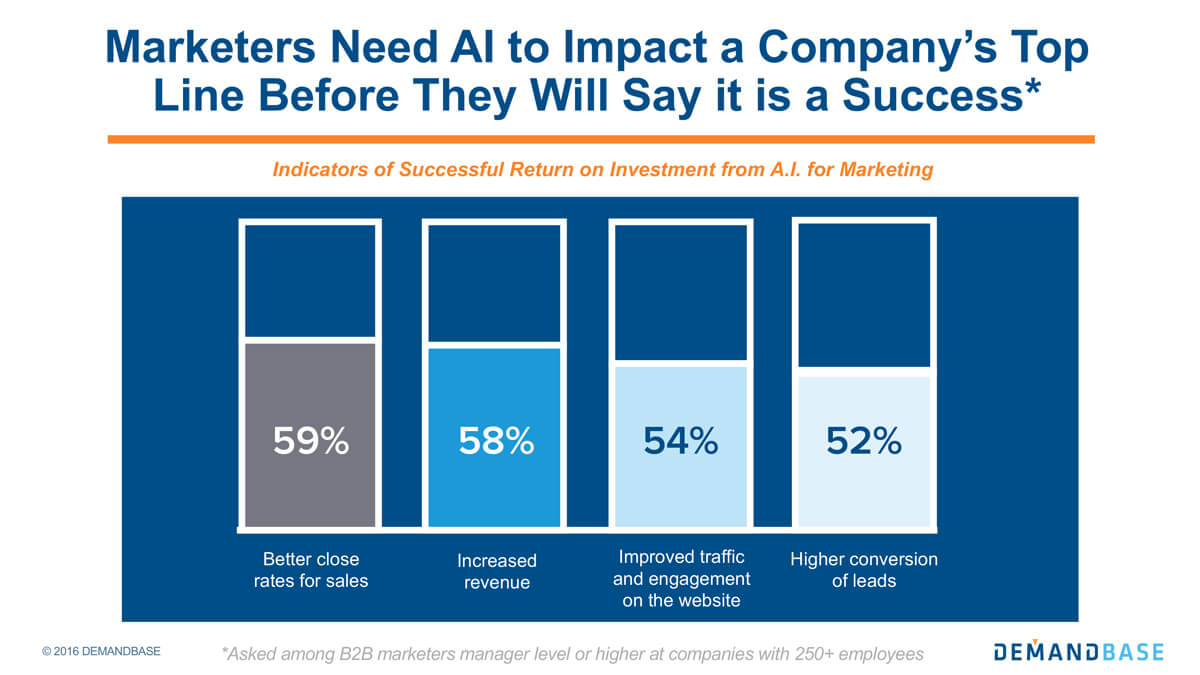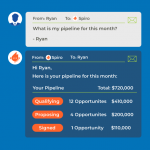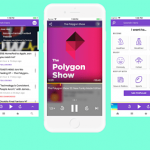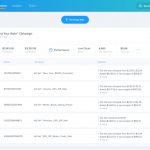Demandbase survey: Marketers sure like them some AI
But only a few are currently using it.
Once upon a time, we writers would note whether some new tech was cloud-based or not.
Now, it’s often assumed that all business software lives in the cloud.
At some point sooner than we think, the same is going to happen to artificial intelligence (AI). You’ll just assume all marketing software employs some flavor of AI.
We’re seeing this complex technology showing up in all kinds of marketing tech, where automated insights, natural language processing and pulling predictive patterns from massive amounts of data can be particularly helpful.
To cite just a few recent announcements: Salesforce’s Einstein, Adobe’s Sensei, Google’s expanded machine learning service, Amazon’s new AI service, Adgorithms’ self-driven marketing/ad platform, YesPath’s AI-powered Account-Based Marketing platform, IBM Watson’s many occupations, Grey Jean’s AI-driven personalization platform, Signpost’s automated customer relationship management platform, Wizer’s AI-based marketing survey tool, and Emarsys’ AI Marketing platform.
And, in October, B2B targeting platform Demandbase launched a business relationship engine that utilizes AI to automatically find potential business account targets, based on inferred needs, interests and connections. The company described this DemandGraph as “B2B’s first AI-driven business graph.”
Since that announcement, SVP Aman Naimat told me, his company has been “using AI for all our offerings, [and] it was imperative to understand what CMOs [know about it].”
So Demandbase conducted a survey to find out what AI means for marketers.
The survey was conducted last month by Wakefield Research, via an online form and an email invitation that garnered 500 responses from B2B marketers — managers or higher — at companies with 250 employees or more. Demandbase said they didn’t provide Wakefield Research with a list of their own customers.
The results, released this week, indicate that most marketers are quite enthusiastic about artificial intelligence, and they seem to understand some of its uses.
But mostly, they’re not actually using it yet. At least they don’t think they are.
Some data points from the survey:
- Slightly more than three-quarters (77 percent) of respondents say AI will be “the next big thing,” even though it’s already popping up all over the place. Twenty-three percent describe it as “just a lot of hype.”
- Seventy-nine percent say it can revolutionize the marketing industry within five years.
- Seventy-eight percent say they are very confident or somewhat confident how to use it for marketing, but 90 percent say they’re not currently using it, 60 percent acknowledge difficulties in integrating AI into their current tools, and 54 percent say they would have difficulty training employees how to use it.
- Among those not currently using AI for marketing, 40 percent say they will within three years.
- And how will they know if their use of AI is successful? From the survey:
The biggest takeaway from the survey, Naimat said, is “the level of confidence that AI is real enough to impact marketing.”
“Ten years ago,” he said, “even asking this question was madness.”
Marketers don’t yet know the details of AI, he noted, but they know it adds intelligence, and they know where they want to apply it to get deeper insights.
AI is a moving target, he said, because, “as we solve problems, we change its definition.”
Currently, Naimat suggested, AI is considered to be more about understanding language and providing insights, but it could evolve toward being more about cognitive understanding and automated decisioning as language and insights become commonplace.
At any rate, marketers will soon have a quick way to find out the latest definition.
They’ll just ask the nearest AI brain what it does.
Marketing Land – Internet Marketing News, Strategies & Tips
(25)
















